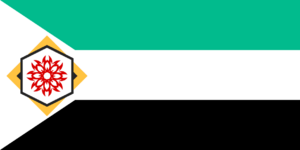Mahdah Lorist Republic
This article is incomplete because it is pending further input from participants, or it is a work-in-progress by one author. Please comment on this article's talk page to share your input, comments and questions. Note: To contribute to this article, you may need to seek help from the author(s) of this page. |
The Mahdah Lorist Republic Mahdah Lorist Respublika | |
|---|---|
|
Flag | |
| Motto: Müstəqillik, Millətçilik, Azadlıq (Independence, Nationalism, Freedom) | |
| Anthem: Tələbə Himni (Student's Anthem) | |
| Location of MLR, Mahda | |
| Capital | Qulluqçu Evi |
| Largest city | Gözəl Küləkli Şəhər |
| Official languages | Madahan Language |
| Recognised regional languages | Lothian Language, Aureumterran Language |
| Ethnic groups (2032) | 35% Mahdahn, 15% Proto-Aureumterran/Nordurlander, 11.2% High Lothian, 3.7% Central Lothian, 1.1% Lower Lothian 10% Āturpātakān, 5% Aureumterran, 5% (Lothian-Azuran? Some form of cross-grouping), 5% Nordurlander-Aureumterran, 10% Other |
| Religion | Aged 18-60
|
| Demonym(s) | Mahdahn |
| Government | Lorist Democracy |
| Zaur Farajov | |
| Mahir Azadlı | |
| Legislature | Lorist Böyük Şurası |
| Formation | |
| 1962 | |
| 1964 | |
| 1992 | |
| Population | |
• 3032 estimate | 26 million |
• 2032 census | 26,102,216 |
| GDP (nominal) | 2032 estimate |
• Total | 500 Billion |
• Per capita | 19,230 |
| Gini (2032) | low |
| HDI (2032) | medium |
| Currency | Mahdan Iari (MII) |
| Time zone | Western Inner Sea Timezone |
| Date format | dd/mm/yyyy |
| Driving side | left |
| Calling code | +21 |
| Internet TLD | .mlr |
The Mahdah Lorist Republic (Mahdah Lorist Respublika), commonly shortened to MLR, is a country located on the coasts of both the Inner and Anagonian Seas, comprised of both severely dry and warm desert towards the interior and more temperate coastal regions where the majority of inhabitants live. The MLR neighbors Lothia (directly), Marquesan (maritime borders near the island of Pandora), Amaldorei (maritime borders near the island of Pandora), and Aureumterra (maritime border), and is the fourth least-populated state of those neighbors, only having a larger population than Amaldorei. It possesses the smallest amount of directly owned territory amongst its neighbors (with the exception of Amaldorei) as well.
Mahdah has been inhabited continuously for one of the longest periods in human history, with remnants of developed coastal civilizations being discovered which date back to the 3,000BCE-2,600BCE Period, and remnants of interaction between early peoples and Lothians dating back to the 5000BCE period, when the settled civilizations which would form the Āturpātakān first came into existence. The Āturpātakān would begin to culturally fuse with Lothian and Nordurlander immigrants, eventually creating the modern Mahdan culture as it is currently recognized, although hold-out populations of all three groups continue to exist in the region, owing to historical separations in regards to property, economic prosperity, and cultural primacy which have not been fully resolved. Mahdah would, for much of history, be under the role of an entrenched scholar-bureaucracy organized upon the principles of the Yanğın Yolu (Fire Road) religion, these bureaucrats exhibiting a stronger political and economic role than the rulers of the many states which would come to occupy the region (excluding a period from 1260CE-1340CE, when the self-proclaimed İmperatorların Kralı (King of Emperors) Űlvi Almsteldt would establish a short lived state functioning off Veldikirkjan religious elements, which claimed to have a more direct connection to Cnut I then the currently ruling Hæstirétt), although their power would begin to fade in the modern era with the entrenchment of merchants and other economic figures in the halls of power.
Mahdah would become a revolutionary state shortly after the Great War, which it participated in on the part of Marquesan. The industrial measures taken to attempt to create a modernized state armaments industry which had not existed before that point, and mass military purges owing to poor command in those few battles upon Pandora it was allowed to participate in, created an entrenched anti-state worker and military element, who would united to abolish the monarchy of the time, then lead by Nərmin Sərvərlı. This would succed, but the new revolutionary, collectivizing state would find few friends and no allies, being placed under a blockade by Aureumterra and its allies. In an attempt to break this encirclement, a clique of young reformers in both the military and student bodies would agitate for the adoption of Lorist principles, with reforms taking place throughout the late 1970's and early 1980's, until the state's first post-revolution elections in 1992, which coincided with the state changing its name from the UMSR to the MLR.
Mahdah in the modern era is a Lorist Democracy, with elections being held between parties and factions emphasizing certain aspects of Lorist policy. It has been suffering an economic downturn since the withdrawl of economic aid from Azura and Janpia in the early 2020's, owing to changing geopolitical priorities.
